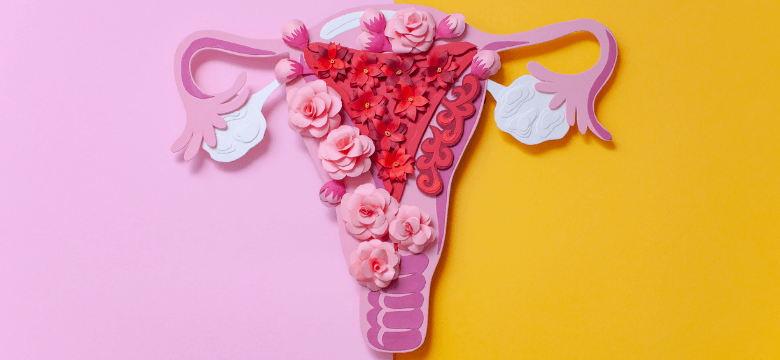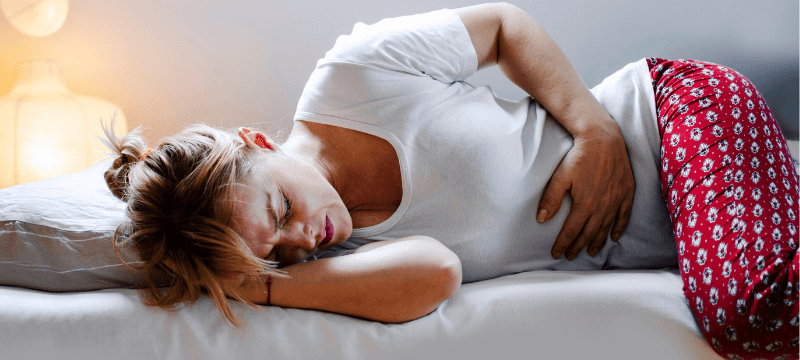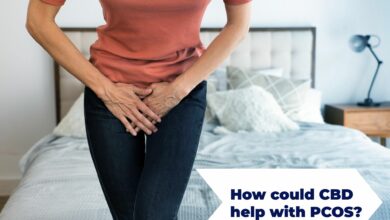
Although more than 1.5 million women in the UK have endometriosis, it is poorly understood and not spoken about enough. If you don’t have endometriosis, you probably know very little about it, if anything at all. However, one thing you should know is that there is currently no cure for endometriosis. And while this is unfortunate, there are various treatments, both natural and pharmacological, that can help ease the symptoms of the disease and even reduce its progression, such as contraceptives and surgery. Many women are also turning to more natural means, such as cannabidiol (CBD), to help manage their symptoms and make living with the disease more manageable. But while many of them are loving the results, can using CBD for endometriosis truly help women living with the condition?
Here we’ll discuss the ins and outs of endometriosis and examine whether CBD can help ease the symptoms and improve the lives of those living with the condition.
Table of Contents
What is endometriosis?
According to the NHS, “Endometriosis is a condition where tissue similar to the lining of the womb starts to grow in other places, such as the ovaries and fallopian tubes.” This tissue acts similar to normal uterine tissue during menstruation, which means it breaks apart and bleeds at the end of the cycle. Since this blood has nowhere to go, surrounding areas will become inflamed and it could even cause scars or lesions. As you can probably guess, this can be extremely painful.
Different types of endometriosis
There are three types of endometriosis:
- Superficial peritoneal endometriosis: The most common type of endometriosis, superficial peritoneal endometriosis consists of flat, shallow lesions on the peritoneum, which is the thin membrane that lines your pelvic cavity. This is the least severe type of endometriosis.
- Cystic ovarian endometriosis (endometrioma): Endometrioma are cysts filled with old blood that form on the ovaries. Because of their brown colour, endometrioma are also known as ‘chocolate cysts’. This form does not respond well to treatment.
- Deep endometriosis: The least common type is deep endometriosis and consists of deep lesions in the peritoneum (at least 5 mm deep). Since the peritoneum is such a thin membrane, deep endometriosis can affect underlying tissue and organs near your uterus, such as your bladder.
These different forms can co-occur, with one patient having more than one type at a time.
Stages of endometriosis
There are four stages of endometriosis classified according to factors such as location, size, amount and depth:
- Minimal: Few small lesions
- Mild: More lesions but still no scar tissue
- Moderate: Deep lesions and possible cysts and scar tissue around ovaries or fallopian tubes
- Severe: many lesions and large cysts on ovaries. Possible scar tissue around reproductive organs and surrounding tissue/organs
The stage a woman is in does not necessarily reflect the level of pain or infertility she is experiencing. For example, a woman in stage one could be experiencing crippling pain, while someone in stage four could have no symptoms.
What causes endometriosis?
There is still a lot we don’t know about endometriosis, including what causes it. However, there are a few theories.
Severe retrograde menstruation
Some medical experts believe endometriosis can be triggered by retrograde menstruation, which is when a woman's menstrual flow goes in the wrong direction. While most women experience retrograde menstruation, experts believe that if it is severe enough, blood containing endometrial cells can pass back into the pelvic cavity through the fallopian tubes and stick to your organs, leading to endometriosis.
Genetics
Genes could play a role in whether you get endometriosis or not. If your mother or sister suffers from the condition, you are much more likely to have it. Unfortunately, studies show that symptoms get worse with each generation.
Immune system disorders
Immune system disorders are sometimes connected to endometriosis, but no direct links have been made.
Symptoms of endometriosis
While there are women with endometriosis who have no symptoms at all, most will experience some of the following:
- Blood in urine or stool
- Chronic abdominal, lower back and pelvic pain, especially during menstruation
- Constant fatigue
- Constipation, diarrhoea and nausea, especially during a period
- Difficulty getting pregnant or infertility
- Heavy bleeding during menstruation
- Pain during sex
- Pain when using the toilet
- Severe period cramps
Endometriosis can have a huge impact on a woman’s life and even lead to depression. It is important to see a doctor as soon as possible if you are experiencing any of the above symptoms or expect you may have endometriosis.
How is endometriosis diagnosed?
It can be difficult to diagnose endometriosis as symptoms can vary and mirror other conditions. Therefore, if your doctor suspects that your symptoms point towards endometriosis, they will do tests to confirm it. These tests include:
- Pelvic exam: Your doctor will try to feel if there are any cysts or scars around your uterus.
- Imaging tests: A gynaecologist will conduct a CT scan, MRI or ultrasound to try and get detailed pictures of your organs.
- Laparoscopy (keyhole surgery): A surgeon makes a small cut in your belly and inserts a laparoscope (thin tube with a camera) to see if there are any lesions and how big they are. This is the only way you can be certain that you have endometriosis.
- Biopsy: your doctor may take a sample of tissue, usually during a laparoscopy, that will be examined under a microscope.
Never self-diagnose a condition as serious as endometriosis. If you suspect you have the condition, make an appointment to see your doctor to discuss your symptoms. They will be able to help diagnose or refer you to any specialists you may need to see.
Endometriosis can be debilitating, so it is essential to discover whether you have it as soon as possible so that you can treat it.
How to treat endometriosis
Although there is no cure for endometriosis, there are ways you can treat the symptoms. Not all treatments may work for you, so it is essential to keep trying until you find what does.
Hormones
Hormonal therapy is one way to treat the symptoms of endometriosis. It can stop your period by lowering the amount of estrogen your body creates. This helps stem the bleeding of any lesions you may have so that you have less inflammation, cysts and scarring.
The hormones used for this include:
- Contraceptives: birth control pills, vaginal rings and patches
- Danazol (Danocrine): medication used to treat endometriosis
- Gonadotropin-releasing hormone (GnRH) agonists and antagonists
- Progestin-only contraceptives
Pain medication
Many women who have endometriosis complain about excruciating pain. Pain is probably one of the worst symptoms of endometriosis, which is why it is so essential to treat it.
Doctors usually recommend over-the-counter painkillers such as Paracetamol and Ibuprofen to relieve pain. However, if this isn’t helping with your pain, speak to your doctor about other options.
Surgery
Your doctor may recommend surgery such as a laparoscope or standard surgery to eliminate as much of the affected tissue as possible. This could improve your symptoms and make getting pregnant easier, but this is not always the case.
If your condition is severe, your doctor may suggest a hysterectomy, which is a surgery that removes your cervix, ovaries, and uterus. However, you need to know that you won't be able to fall pregnant after getting a hysterectomy, so it is not a good idea to have this surgery if you want to have children.
Natural methods
As you can see, treatment usually includes surgery or medication. However, more patients are turning to natural options to make living with endometriosis easier. More natural treatments include:
- Acupuncture
- Ayurveda
- Herbal medicine
- Lifestyle changes
- Massage
With all its purported benefits, CBD has become very popular among endometriosis patients who use it to help ease some of their symptoms. And while many users are raving about the positive effects, is there any truth to this?
Can you use cannabis for endometriosis?
Various studies show that cannabis has multiple properties that can help ease and manage the symptoms associated with endometriosis, thanks to cannabinoid receptors found throughout the body, primarily in the neurological systems, as well as the immune system, organs, endometrium and gut lining. Cannabis contains two cannabinoids, called THC and CBD, that interact with cannabinoid receptors. Both cannabinoids have been shown to help with endometriosis treatment, especially regarding inflammation, which is one of the most common symptoms of endometriosis.
Cannabis has anti-inflammatory properties, and some studies show that it can be beneficial for chronic pain, which is another symptom of endometriosis. Furthermore, endometriosis can also cause other symptoms like anxiety and depression, which research has shown can be alleviated by cannabis.
From the research mentioned above, it is clear that there is mounting evidence that cannabis has the potential to help manage the symptoms of endometriosis. But does the same go for CBD and CBD oil?
Can CBD help with endometriosis?
In some patients, CBD and CBD oil has been shown to help with endometriosis. Endometriosis causes severe inflammation, which is one of the main reasons sufferers experience pain and discomfort. CBD is known for its anti-inflammatory and mild analgesic properties, which help reduce the pain and relieve inflammation caused by endometriosis.
However, studies regarding CBD and endometriosis are still in their infancy, and there is still a lot to learn before we can confirm any of these benefits. Nonetheless, current CBD studies and positive anecdotal evidence from users regarding CBD for endometriosis are promising.
Side effects of CBD for endometriosis
While it is largely safe to use CBD, some mild side effects could occur, although these are very rare. Some side effects include:
- Change in appetite
- Diarrhoea
- Dry mouth
- Drowsiness
- Fatigue
CBD can also interact with other medications you may be on, so it is imperative to peak with your doctor first before using CBD.
Key takeaways
Living with endometriosis can be both physically and mentally challenging, but there are things you can try to help ease the burden and make life a bit easier, such as CBD. And while it may not be a miracle cure, and we need to find out much more about it before we can make any claims, several studies show compelling evidence that CBD could be a valuable tool to help fight the symptoms of endometriosis. Hopefully, it won't take too long before we know for sure. Watch this space.
You may also like to read: CBD Oil for Arthritis – Can it help with easing the pain?






